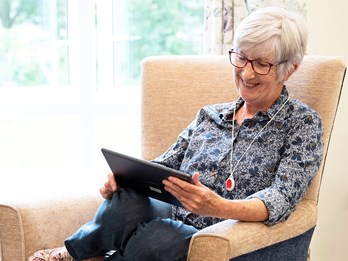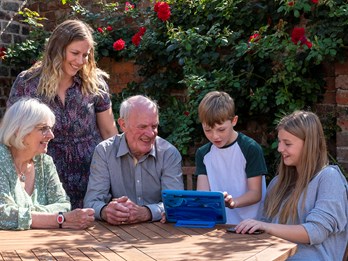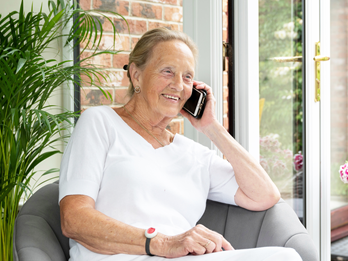Using technology to help people live well with dementia
Sep 1, 2021
In the UK, someone develops dementia every three minutes, and the Alzheimer’s Society estimates that the number of people living alone with the condition will double to 240,000 in the next 20 years.1 Gavin Bashar, UK Managing Director of Tunstall Healthcare, explains how technology such as telecare can help people with dementia and those who care for them in a way that promotes independence as well as managing risks.
With 225,000 people developing dementia each year it has never been as important to introduce measures into people’s lives to protect their dignity and safety, and improve quality of life. The pandemic has also highlighted just how important it is to find ways to deliver care and support remotely, and connect people with services and their families using technology.
Technology is crucial in enabling the delivery of care, which means people living with dementia can enjoy more independence for an extended period of time. It can also help to relieve the pressure on carers, reducing stress and enabling them to care for longer. As our social care and health systems continue to experience limited budgets and rising demand, it’s becoming increasingly important that providers employ solutions which enable care to be delivered in a more effective and person-centred way.
A range of solutions
Telecare is one way of providing essential support. Systems can be tailored to the needs of the individual, helping to manage events such as falls, medication management and people leaving their home and being unable to find their way back. They can be configured to ensure help is automatically provided in the event of an emergency, 24 hours day, from a carer, response service or the emergency services as appropriate. They can also enable carers to carry out daily activities, or have uninterrupted sleep as they know they will be alerted in the event of an incident.
Telecare in practice
For example Mrs A lives with her son and daughter-in-law, and her daughter-in-law has cared for her for 16 years including prompting with personal care, washing, dressing, medication, meal preparation and cleaning. As well as dementia, Mrs A is hard of hearing, has diabetes, high cholesterol and arthritis and has had a series of TIAs and several falls. Because of her poor mobility, the likelihood of falling and her short term memory issues, her family would very rarely leave her alone, which had a big impact on her daughter in-law in particular. A telecare system was introduced, including a pager, which alerts Mrs A’s daughter-in-law to events when she is in a different area of the house. Mrs A wears an iVi pendant which automatically raises an alert on the pager if it detects she has fallen. A bed sensor has also been installed which will raise an alert if Mrs A leaves her bed during the night and doesn’t return safely after a short time. The system has reduced the strain on the family, and prevented Mrs A need to move into a care home. Telecare gives them the reassurance that they will be alerted if Mrs A needs them, and allows them to spend time in other parts of the home without constantly checking and worrying. As the system can be diverted to raise an alert at the monitoring centre instead of the CareAssist the family can now spend a little time away from the home and feel reassured that they will be contacted in the case of an emergency.
Integration is key
Although technology is a fantastic resource when it comes to supporting people with dementia, no matter where they live, it should never be seen as a means replace human interaction and care. Technological solutions should always be connected to the wider cycles of care within housing, health and social care, but there is no doubt that as in most other areas of life, technology will have an increasing role to play how people can live well with dementia.
Source 1: https://www.alzheimers.org.uk/news/2019-05-15/lonely-future-120000-people-dementia-living-alone-set-double-next-20-years



